How defeated Yugoslavia and Greece
The strategic importance of the Balkans. Background of the Yugoslav and Greek operations
During the development of the Second World War, the Balkan Peninsula had a great military, political and economic importance. Control over this region made it possible to create a strategic base for expanding expansion into other regions - the Mediterranean, the Middle East, and Russia. The Balkans have long had important political, strategic and economic importance. Control of this area allowed to extract large profits, use local human resources and strategic raw materials. Important communications passed through the peninsula, including its coastline and islands.
Hitler's Germany considered the Balkan Peninsula as a southern strategic base for a strike on the USSR. Having seized Norway and Denmark, having allied Nazi Finland, Germany secured the northwest invasion bridgehead. The seizure of the Balkan Peninsula provided the southern strategic flank of the German Empire. Here it was supposed to concentrate a large group of Wehrmacht to strike at Ukraine-Little Russia and further to the Caucasus. In addition, the Balkans were to become an important raw material and food base of the Third Reich.
The Balkan Peninsula was also considered by the military and political leadership of the Third Reich as an important springboard for the implementation of further plans to establish its own world order. The Balkans could become a base for the struggle for supremacy in the Mediterranean, the Middle East and North Africa, for further penetration into Asia and Africa. The seizure of the Balkan Peninsula allowed the Hitlerites to create here supporting naval and air bases to gain domination in the eastern and central Mediterranean, disrupting communications of the British Empire, through which the British received oil from the Middle East.
In the struggle for the Balkans, Berlin in the second half of 1940 - the beginning of 1941. achieved some success. Hungary, Romania and Bulgaria joined the Tripartite Pact (Berlin-Rome-Tokyo axis). This seriously strengthened the position of Germany in the Balkans. However, the position of such important states as Yugoslavia and Turkey was still uncertain. The governments of these countries have not joined any of the warring parties. Greece, having strong positions in the Mediterranean, was under British influence, although it also listened to Berlin (led a "flexible" policy).
The Balkan Peninsula was also of great strategic importance for Britain. He covered the possessions of England in the Mediterranean, in the Near and Middle East. In addition, the British planned to use the armed forces and the human resources of the Balkan states in their own interests and to form on the peninsula one of the fronts of the struggle against the Third Reich. It is also worth remembering that at this time London hoped that a clash of German and Soviet interests would occur in the Balkans, which would develop into an armed confrontation and thereby distract the leadership of the Third Reich from Britain and the Balkan Peninsula. The main goal of London was a war between Germany and the USSR, so that the two great powers would destroy each other’s potential, leading to victory in the Great Game of the Anglo-Saxons project.
Thus, the Balkan Peninsula, directly overlooking the Mediterranean Sea, on the one hand, was an important springboard for the implementation of the operational and strategic goals of Italy and Germany, which headed for changing the world order in their favor, on the other - was an important raw material, food base and source of human resources. Important communications also passed through the Balkans, including the shortest route from Europe to Asia Minor, to the Near and Middle East, which were important in the plans of the builders of the Eternal Reich. In addition, the armed forces of the Balkan states and Turkey played an important role in the balance of military power in this region. If Hungary, Romania and Bulgaria acted as allies of Berlin, then Yugoslavia and Greece were viewed as potential enemies, even with the flexible and often pro-fascist policy of their elite. It is also worth remembering the strategic interests of Britain.
According to the original plan of the German "global strategy", Italy had to play the main role in the expansion in the Mediterranean, in Africa and the Balkans. She had to tie down the forces of England and France in these regions and provide the Wehrmacht with favorable conditions for ending the war in Europe. Germany itself planned to actively begin the development of these territories after the final victory in Europe.
This was facilitated by the policy of Italy itself. Rome was counting on widespread colonial seizures and, even before the war, began the creation of a "great Roman Empire." Fascist Italy was positioned as a direct heir to Ancient Rome. In the Balkans, the Italians planned to seize Albania and part of Greece. However, the Italians turned out to be bad warriors (plus a weak industrial base and a shortage of raw materials, which prevented the creation of modern armed forces) and even in the conditions when France was defeated by the Wehrmacht and England had to go over to strategic defense and make extraordinary efforts to maintain positions in the Mediterranean and Middle East, in Africa, could not independently solve the tasks set earlier. In Kenya and Sudan, the Italians could not develop their first successes, and went on the defensive. The offensive in North Africa in September 1940 also failed, the Italians were advancing from Libya into Egypt. The length of the rear, supply interruptions and, most importantly, the general weakness of the Italian military machine, had an effect.
However, Mussolini decided to unleash another war - to conduct a sudden, "lightning" campaign against Greece. Rome planned to include Greece in its sphere of influence. Mussolini told Foreign Minister Ciano: “Hitler always puts me in front of a fait accompli. But this time I will repay him with the same coin: he learns from the newspapers that I have occupied Greece. ” October 15 was developed operational directive on the attack of the Italian army against Greece. It stated that at the first stage of the operation, Italian troops from the territory of Albania should strike a sudden blow at Yanina with the task of breaking through the defenses of the Greek army, defeating it. Then build on the success of the mobile forces along the highway Girokastra-Ioannina, seize the north-western region of Greece - Epirus, continue the attack on Athens and Thessaloniki. At the same time it was planned, after landing the navy, to occupy the Greek island of Corfu.
On the night of October 28, 1940, the Italian ambassador Emanuele Grazzi presented Metaxas with a three-hour ultimatum demanding that the Italian troops be free to occupy vague "strategic sites" in Greece. Metaxas rejected the Italian ultimatum. Even before the completion of the ultimatum 140 thousand 9th Italian Army (250 tanks and armored vehicles, 700 guns and 259 aircraft) invaded from Albania into Greek territory. On the border with Albania, there was only a Greek border group of 27 thousand soldiers (20 tanks, 220 guns and 26 aircraft). That is, the Italian troops had complete superiority. The Italians broke through the Greek defenses on a 50-kilometer stretch and broke into the territory of Epirus and Macedonia.
The Greek government of Metaxas and the General Staff, not daring to confront Italy, ordered the epirus army to retreat, not engaging with the enemy. However, the Greek soldiers refused to carry out a criminal order and engaged in battle with the invaders. They were supported by all the people. In Greece, the patriotic rise began. The Greek border units and the epirus army put up stubborn resistance, and the Italian army, having lost the first offensive outburst, got bogged down and 8 November stopped the offensive. The Greeks went on the counteroffensive and by the end of November 1940 the Italians fell back almost to their original positions. Thus, the Italian blitzkrieg failed. The enraged Mussolini replaced the supreme command: the Chief of the General Staff, Marshal Badoglio, and the commander-in-chief of the troops in Albania, General Visconti Praska, resigned. General Cavallero became chief of the General Staff and part-time commander of the Greek campaign.
The Greek military and political leadership, instead of using a favorable military situation and pursuing a defeated enemy in Albania to destroy the potential of the new Italian invasion, succumbed to the pressure of Berlin, who recommended “not to beat Italy so hard, or else the host (Hitler) will start be angry". As a result, the success of the Greek army was not developed. Italy retained the invasion potential, and Germany continued to prepare for the invasion of the Balkans.
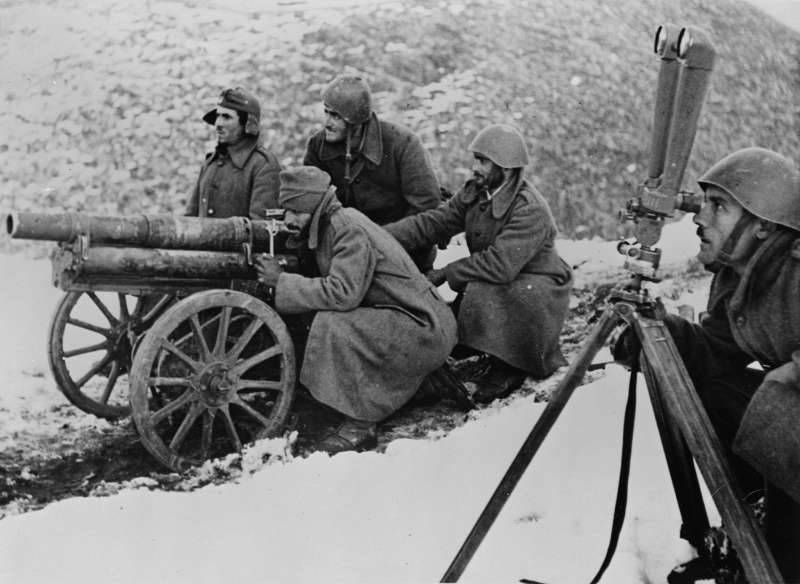
Greek gunners fire in the mountains from the mountain version of the 65-mm gun during the war with Italy
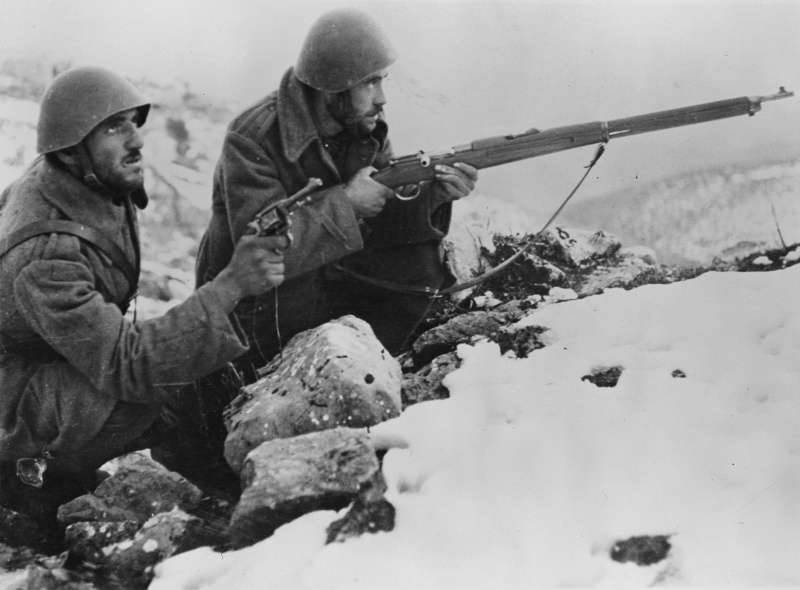
Greek soldiers in battle in the mountains during the war with Italy
Italy, meanwhile, suffered serious new defeats. British troops in Egypt, having received reinforcements, on December 9, 1940 went over to the counteroffensive. The Italians were not ready to strike, immediately defeated and fled. By the end of December, the British cleared all of Egypt from Italian troops, and in early January 1941 invaded Cyrenaica (Libya). The heavily fortified Bardia and Tobruk capitulated to the English army. The Italian army of Graziani was completely destroyed, 150 thousand people were captured. The pitiful remnants of the Italian army (about 10 thousand people) fled to Tripolitania. The British stopped the offensive in North Africa and transferred the bulk of the army from Libya to Greece. In addition, the British Air Force carried out a successful operation against the Italian naval base of Taranto. As a result of the raid, 3 battleships (out of 4) were disabled, which gave the British an advantage the fleet in the Mediterranean Sea.
Britain tried to strengthen its position in the Balkans. As soon as the Italo-Greek war began, the British urgently attempted to put together an anti-German bloc in the Balkans in Greece, Yugoslavia and Turkey with the support of England. However, the implementation of this plan faced great difficulties. The Turks refused not only to join the anti-German bloc, and to fulfill their obligations under the Anglo-French-Turkish Treaty of October 19 from 1939. The Anglo-Turkish talks that took place in January, 1941, showed the futility of British attempts to attract Turkey to help Greece. Turkey in the conditions of the beginning of the world war, when the former dominant influence of France and England was extremely weakened, was seeking benefits in the changed conditions. Greece was the traditional enemy of the Turks, and Turkey was gradually leaning toward Germany, planning to profit at the expense of Russia-USSR. The leadership of Yugoslavia, although it refrained from joining the Tripartite Pact, but also pursued a “flexible” policy, not intending to oppose Berlin.
London’s policy in the Balkans was actively supported by the United States. In the second half of January, the personal representative of President Roosevelt, one of the leaders of American intelligence, Colonel Donoven, traveled to the Balkans with a special mission in the second half of January. He visited Athens, Istanbul, Sofia and Belgrade, urging the governments of the Balkan states to pursue policies in the interests of Washington and London. In February and March 1941. American diplomacy continued to put pressure on the Balkan governments, especially on Yugoslavia and Turkey, achieving the main goal - to prevent Germany from gaining in the Balkans. All these actions were coordinated with Britain. According to the British Defense Committee, the Balkans at that time acquired crucial importance.
In February, 1941, British Foreign Secretary Eden, and Chief of the Imperial General Staff, Dill, left for a special mission to the Middle East and Greece. After consulting with the British command in the Mediterranean region, they were in the Greek capital. 22 February an agreement was reached with the Greek government on the upcoming landing of the British Expeditionary Force. However, it was not possible to agree in a similar way with Belgrade.
Thus, Italy could not independently solve the task of establishing domination in Africa, the Mediterranean and the Balkans. In addition, Britain and the United States increased its pressure on the Balkans. This forced the Third Reich to engage in open struggle. Hitler decided to use the situation that had arisen in order to take dominant positions in the Balkans under the guise of helping Allied Italy.
Operation Marita
12 November 1940, Adolf Hitler signed directive No. 18 on the preparation, “if necessary,” of an operation against Greece from the territory of Bulgaria. According to the directive, it was planned to create in the Balkans (in particular, in Romania) a group of German troops comprising at least 10 divisions. The plan of the operation was clarified during November and December, was tied to the “Barbarossa” option and by the end of the year was set out in a plan under the code name “Marita” (lat. Marita - spouse).
According to Directive No. 20 from December 13 1940, the forces that were used to carry out the Greek operation increased significantly until the 24 divisions. The directive set the task of occupying Greece and demanded the timely release of these forces in order to fulfill the “new plans”, that is, participation in the attack on the USSR.
Thus, plans to invade Greece were developed by the German military and political leadership at the end of 1940. However, Germany was in no hurry to invade. Fail Italy planned to use for even greater subordination of Rome to the German leadership. In addition, forced to wait indefinite position of Yugoslavia. In Berlin, as in London, they planned to attract Belgrade to their side.
The decision to invade Yugoslavia
Berlin has increased pressure on Belgrade, using economic opportunities and the German community in Yugoslavia. In October, 1940 signed the German-Yugoslav trade agreement, which strengthened the economic dependence of Yugoslavia. In late November, the Yugoslav foreign minister arrived in Berlin to negotiate the accession of Belgrade to the Tripartite Pact. For participation in the pack, Belgrade was offered the Greek port of Thessaloniki. In February - March 1941, the negotiations continued at a higher level - Yugoslav Prime Minister Cvetkovic and Prince Regent Pavel visited Germany. Under strong German pressure, the Yugoslav government decided to join the Tripartite Pak. But the Yugoslavs uttered a number of concessions: Berlin pledged not to demand military assistance from Yugoslavia and the right to let troops pass through its territory; after the war ended Yugoslavia was to receive Thessaloniki. 25 March The 1941 Protocol was signed in Vienna on the accession of Yugoslavia to the Tripartite Pact.
This agreement was a betrayal of all previous policy and national interests, especially Serbia. It is clear that caused the anger of the people and a significant part of the elite, including the military. The people regarded this act as a betrayal of national interests. Across the country, protests began with slogans: “Better war than a pact!”, “Better death than slavery!”, “For an alliance with Russia!” In Belgrade, unrest swept all educational institutions, in Kragujevac, 10 thousand participated in them. man, in Cetinje - 5 thousand. 26 March 1941. The rallies and demonstrations continued, many thousands of protest rallies against the signing of the treaty with Germany were held on the streets of Belgrade, Ljubljana, Kragujevac, Chachak, Leskovac. In the 400 thousandth of Belgrade, at least 80 thousand people turned out to protest. In Belgrade, protesters defeated the German information bureau. As a result, part of the military elite, associated with the political opposition and British intelligence, decided to carry out a military coup.
On the night of March 27 1941, relying on like-minded officers and units of the air force, the former head of the Air Force and the General Staff of Yugoslavia Dusan Simovich (was removed due to objections to military cooperation of Yugoslavia with Germany) carried out a coup d'etat and removed the prince Regent of Paul. Cvetkovic and other ministers were arrested. On the royal throne planted 17-year-old Peter II. Simovich himself took the post of prime minister of Yugoslavia, as well as the post of chief of the General Staff.
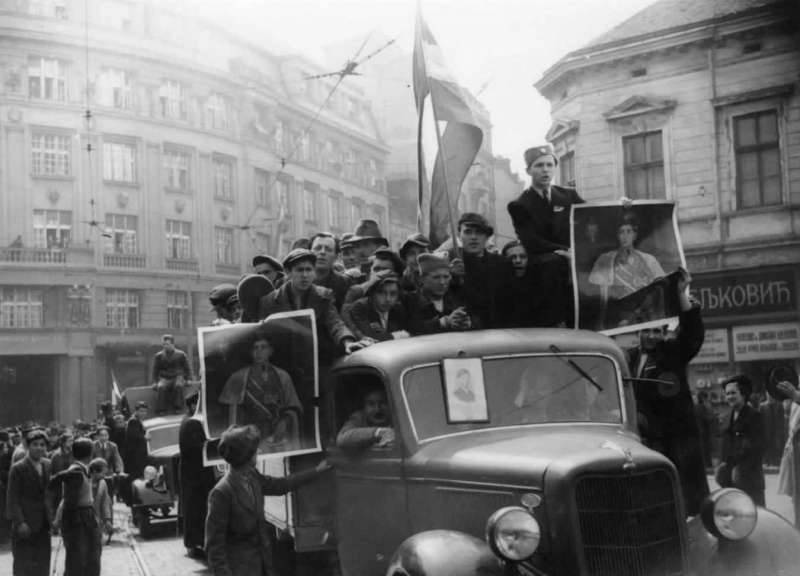
Belgrade residents welcome 27 March coup 1941
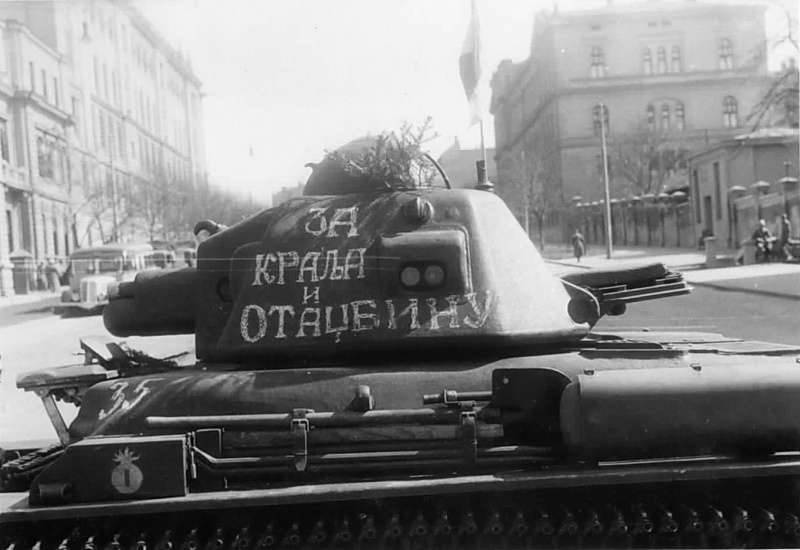
Renault Tank R-35 on the streets of Belgrade on the day of the military coup of March 27 1941. The inscription on the tank: "For the king and fatherland"
Unwilling to provide a pretext for the start of the war, the Simovic government acted cautiously and hesitantly, but immediately after the coup in Yugoslavia, in the imperial office in Berlin, Hitler held a meeting with the commanders of land and air forces and their chiefs of staff. It announced the decision to "make all the preparations to destroy Yugoslavia militarily and as a national unit." On the same day, Directive No. 25 on the attack on Yugoslavia was signed. It stated that the “military coup” in Yugoslavia caused changes in the military-political situation in the Balkans and that Yugoslavia, even if it makes a statement of its loyalty, should be considered as an enemy and must be defeated.
In addition to Directive No. 25, the Wehrmacht Supreme Command issued an “Ordinance on propaganda issues against Yugoslavia”. The essence of the information war against Yugoslavia was to undermine the moral spirit of the Yugoslav army, to kindle national contradictions in this “patchwork” and in many ways artificial country. The aggression against Yugoslavia was shown by the Hitler propaganda machine as a war against the government of only Serbia. Supposedly Belgrade was oriented toward England and "oppressed other Yugoslav peoples." Berlin planned to cause anti-Serb sentiments among the Croats, Macedonians, Bosnians, etc. Partially this plan led to success. For example, the Croatian nationalists promised to support the German troops during the war against Yugoslavia. Croatian nationalists acted from the territory of Italy. 1 April 1941, the leader of the Croatian nationalists Ante Pavelic, with the permission of Mussolini, began to conduct propaganda programs on the Croats living in Yugoslavia from the Italian radio station ETAR. At the same time, formation of combat units from Croatian nationalists began on Italian territory. Croatian nationalists planned to declare the independence of Croatia at the beginning of the war.
The German command decided to launch an attack on Greece simultaneously with the attack on Yugoslavia. Scheduled for 1 on April 1941, the invasion of Greece was postponed for several days. The Marita plan was fundamentally processed. Military operations against both Balkan states were considered as a single operation. After 30 March 1940, the final attack plan was approved, Hitler sent a letter to Mussolini, saying that he was awaiting help from Italy. The German leadership, not without reason, hoped that the attack on Yugoslavia would meet with the support of Italy, Hungary and Bulgaria, whose armed forces could be attracted to the occupation of the country, promising territorial gains: Italy - the Adriatic coast, Hungary - Banat, Bulgaria - Macedonia.
The invasion was supposed to be carried out by applying simultaneous strikes from the territory of Bulgaria, Romania, Hungary and Austria in converging directions to Skopje, Belgrade and Zagreb in order to dismember the Yugoslav army and destroy it in parts. The task was to seize primarily the southern part of Yugoslavia in order to prevent communication between the armies of Yugoslavia and Greece, to unite with the Italian troops in Albania and to use the southern regions of Yugoslavia as a springboard for the subsequent German-Italian attack on Greece. The air force had to strike at the Yugoslav capital, destroy the main airfields, paralyze the rail link and thereby disrupt mobilization. Against Greece, it was planned to deliver the main attack in the direction of Thessaloniki, with the subsequent advancement into the area of Olympus. The beginning of the invasion of Greece and Yugoslavia was assigned to 6 on April 1941.
The new Yugoslav government tried to continue the “flexible” policy and “gain time”. As a result, a paradox arose: the government, which came to power in the wake of a popular protest against the pro-German policy of the previous authorities, did not officially declare the breakdown of the contractual relations defined by the pact. However, Belgrade intensified contacts with Greece and the UK. 31 March 1941 British General J. Dilley’s personal secretary to the British foreign secretary, P. Dickson, arrived in Belgrade from Athens for talks. On the same day, March 31, the General Staff of Yugoslavia ordered the troops to begin the implementation of the R-1941 plan, which had a defensive character and assumed the formation of three army groups: 41-I army groups (1-I and 4-I armies) - on the territory Croatia; 7-I army group (2-I, 1-I, 2-I armies) - in the area between the Iron Gate and the Drava River; 6-I army group (3-I and 3-I armies) - in the northern part of the country, near the border with Albania.
Under pressure from the masses, who traditionally saw Russia as an ally and friend, and also wanting to get USSR support in a difficult situation on the world stage, Simovich turned to Moscow with a proposal to conclude an agreement between the two countries. 5 April 1945 was signed in Moscow "Treaty of friendship and non-aggression between the Union of Soviet Socialist Republics and the Kingdom of Yugoslavia".
To be continued ...
Application. Directive No. 20 of December 13 1940
1. The outcome of the fighting in Albania is not yet clear. Given the threatening situation in Albania, it is doubly important to thwart British strivings to create, under the protection of the Balkan front, dangerous especially for Italy, and along with that for the Romanian oil regions, a springboard for air operations.
2. Therefore, my intention is to:
a) Establish a gradually reinforced grouping in the coming months in southern Romania.
b) After the establishment of favorable weather - probably in March - this grouping should be thrown through Bulgaria to occupy the northern coast of the Aegean Sea and, if necessary, the entire mainland part of Greece (Operation Marita).
Bulgaria’s support is expected.
3. The grouping concentration in Romania is as follows:
a) The 16-I tank division arriving in December is placed at the disposal of a military mission whose mission remains unchanged.
b) Immediately thereafter, a strike force consisting of approximately 7 divisions (1 and deployment echelon) is being redeployed in Romania. Engineering units in the quantities necessary for the preparation of the Danube crossing may be included in the transports of the 16 Panzer Division (under the guise of "training units"). On the use of them on the Danube, the commander-in-chief of the land army will receive my instructions in due time.
c) Prepare the transfer of further transports to the maximum for the Marat operation (24 div.).
d) For the Air Force, the task is to provide a concentration of troops from the air, as well as to prepare for the creation of the necessary command and rear services in the Romanian territory.
4. The operation “Marita” should be prepared on the basis of the following principles:
a) The first objective of the operation is the occupation of the Aegean coast and the gulf of Thessaloniki. Continuing the offensive through Larissa and the Corinthian Isthmus may become necessary.
b) We give the cover from the flank from Turkey to the Bulgarian army, however it should be strengthened and provided by German units.
c) It is not known whether the Bulgarian formations will also participate in the offensive. Also now it is still impossible to clearly represent the position of Yugoslavia.
d) The objectives of the Air Force will be effective support for the advancement of ground troops in all sectors, suppression of the enemy aviation and, as far as possible, the occupation of British strongholds on the Greek islands by airborne landing.
f) On the question of how the operation of Marita will be supported by the Italian armed forces, how the operations will be coordinated, will be decided later.
5. Especially the great political influence of military preparations in the Balkans requires precise control of all relevant command activities. The dispatch of troops through Hungary and their arrival in Romania shall be announced gradually and at first justified by the need to strengthen the military mission in Romania.
Negotiations with the Romanians or Bulgarians, which can indicate our intentions, as well as informing the Italians in each case should be approved by me; also the direction of intelligence agencies and lodgers.
6. After the operation "Marita" it is planned to transfer a lot of compounds used here for a new use.
7. I am awaiting reports from the commanders-in-chief (as far as the land army has already been received) about their intentions. Provide me with accurate schedules of the planned preparations, also about the necessary call from the enterprises of the military industry (the formation of new divisions that are on vacation).
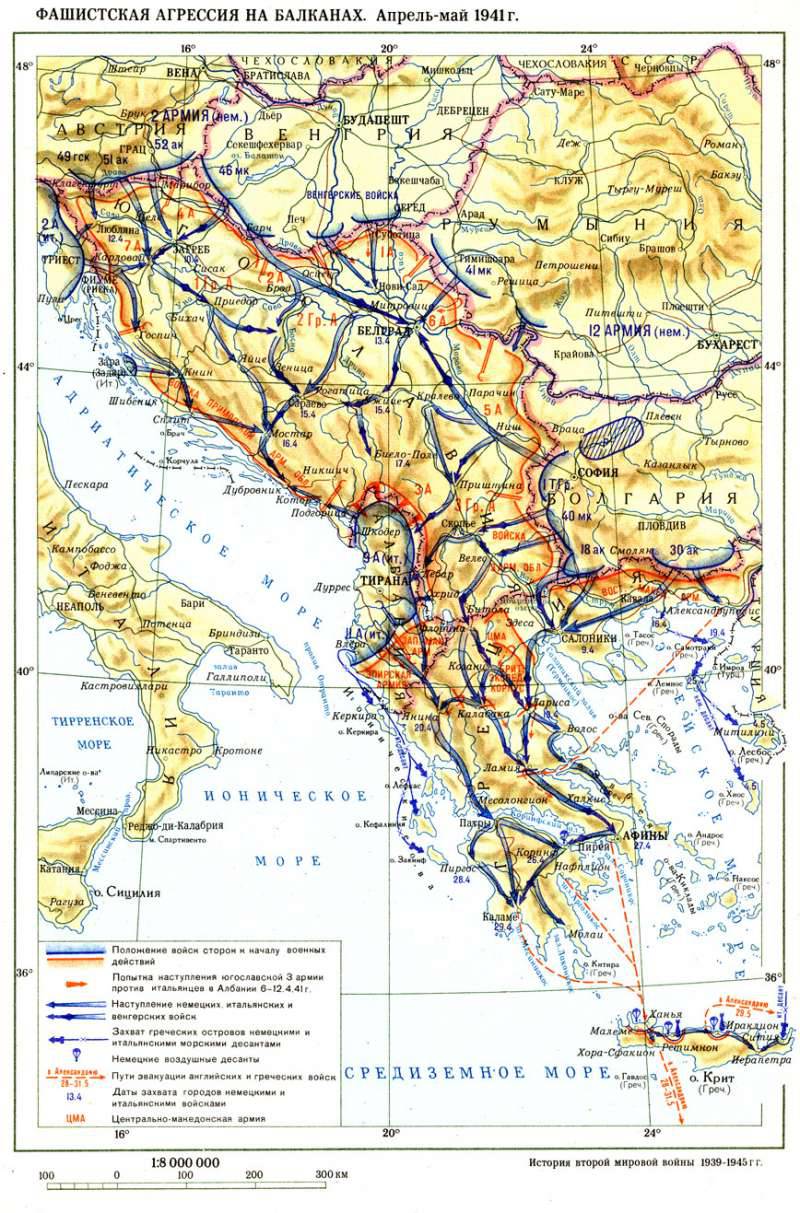
Information